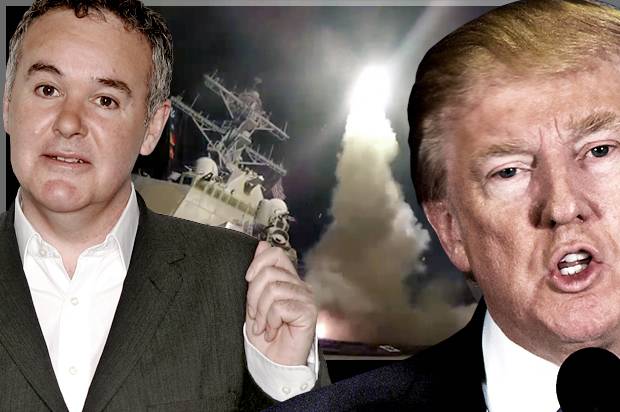At Salon, Jacob Sugarman interviews Adam Curtis about the US’s recent missile strike in Syria and the lessons of Trump’s election that liberals refuse to learn. Curtis argues that Trump is less an alarming break from US political norms—a plunge into fascism—than the continuation of longstanding trends towards demagoguery and governance by spectacle. Read an excerpt from the interview below:
Jacob Sugarman: So in less than a week since we first spoke, Donald Trump has done a complete about-face on Syria and Bashar al-Assad. Obviously we’re just hours removed from the airstrike, but what are your first impressions? Does this signal to you that the Pentagon is dictating his foreign policy? Is this bombing campaign an elaborate piece of political theater or is it more likely the opening gambit in a prolonged assault?
Adam Curtis: No one knows what the attack means, or how it will play out. It is far too early. My first reaction is that what may be happening is that President Trump is stepping for the first time into the real world. But he will discover that the consequences may be very different and far more complex than he imagines.
Firstly, the question that has not really been addressed is, why did the Syrians use chemical weapons? If, as we are constantly being told, the regime is winning the civil war, why did they do something like that? Some analysts and journalists are saying that possibly Assad is not winning; that the Syrian army is exhausted and starting to fall apart; and that the Russians are finding the conflict far more difficult to deal with than they imagined, especially with just dropping bombs. Most of the really hard fighting for Aleppo was not done by the Syrian army but by Hezbollah, which is becoming a really serious army. And behind them are the Revolutionary Guards of Iran.
Secondly, such an intervention leads to the question, who are the goodies and who are the baddies in this war? If President Trump has turned against Assad and will genuinely work for his removal, then who should replace him? This is the reality that President Obama faced and recoiled from because there is no simple answer. Just as the Americans discovered in Afghanistan, which had also been fighting a civil war since 1978, everyone is compromised in some way, because they have all been sucked into a grinding struggle for power. The truth is that no-one in America who is pushing for something to be done about Syria—the liberal humanitarians, the neoconservatives, the globalists in the military—has any real answer about who to support.
The other possibility is that it may be just another part of the pantomime, a missile hit designed to distract from scandals at home. But that takes you back to President Clinton’s missile attack against Osama bin Laden’s training camps in 1998—an attack that many believed was not only a retaliation for the bombings of U.S. embassies in Kenya and Tanzania but an attempt at distracting attention from the Monica Lewinsky scandal. And looking back that doesn’t seem to have been a very good idea. It had a very counter-productive effect on the Taliban. Up to that point they were really fed up with bin Laden and were looking for ways to be rid of him, even possibly giving him up to the Americans. After the attacks the Taliban stopped all that.
The truth is that we in the West have so simplified our vision of the world, into a battle between good and evil, that we now find it impossible to understand the reality. It was a process that started in the 1990s under Clinton and Blair, but both Trump and his enemies, the liberal interventionists, have inherited that one-dimensional view. It is dangerous because it ignores the realities of power in societies. And Trump may find he is opening the door to something very complicated, not just Syria but the forces that surround it—Turkey, Iran, Saudi Arabia and Israel, all of whom are deeply involved in the conflict.
And it will also have a terrible effect for Trump domestically. All the hard-line isolationists who backed him will be furious. It’s just what Hillary Clinton would have done, they will cry. Trump has become a deep state puppet.
JS: We’re more than 70 days into Trump’s presidency, just a few weeks short of the juncture when historians and political analysts begin to assess an office in earnest. Do you see America sliding into authoritarianism or fascism, or are the evils of this administration more banal than that?
AC: America is not sliding into fascism. That’s just hysteria by the liberals who can’t face up to the fact that they lost the election, so they either have to blame the Russians or giant historical forces. Basically, a right-wing president has been elected, and he’s created a brilliant machine that captures liberals and keeps them completely preoccupied. What he does is he wakes up in the morning, tweets something that he knows isn’t true, they get very upset and spend the whole day writing in big capital letters on social media, “This is outrageous. This is bad. This is fascism.” What they’re not facing up to is the real question, which is why did Donald Trump win the election? What other forces in the country had they, the liberals, not seen?
They weren’t defeated by something as grand as fascism. They were defeated by a man who’s connected with a disaffected group in America, like the people who voted for Brexit in my country. I think there’s a great deal of narcissism which Mr. Trump has worked at how to play on beautifully.
Image of Adam Curtis and Donald Trump via Salon.
